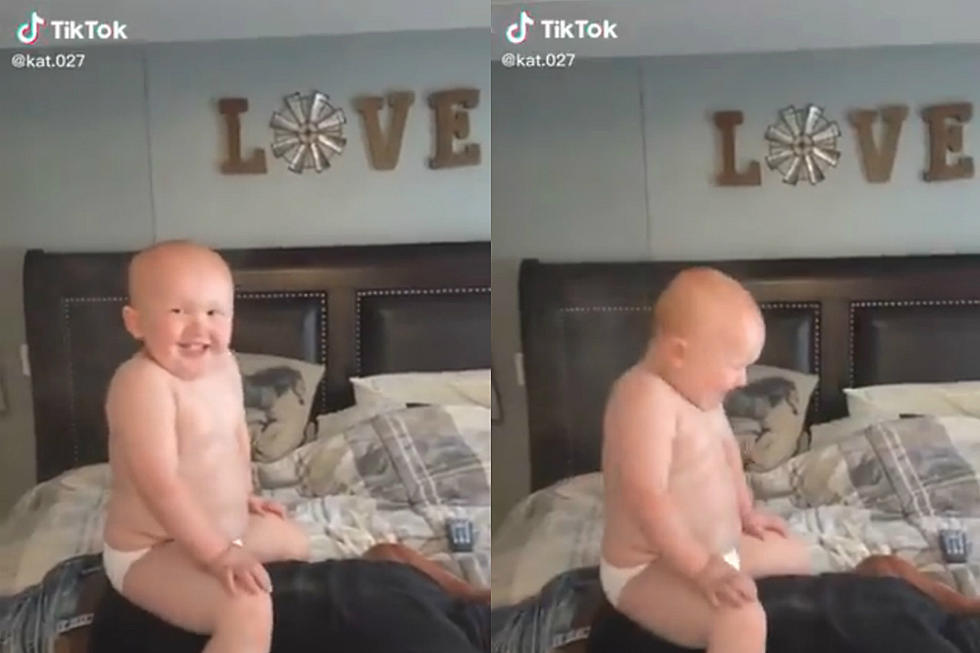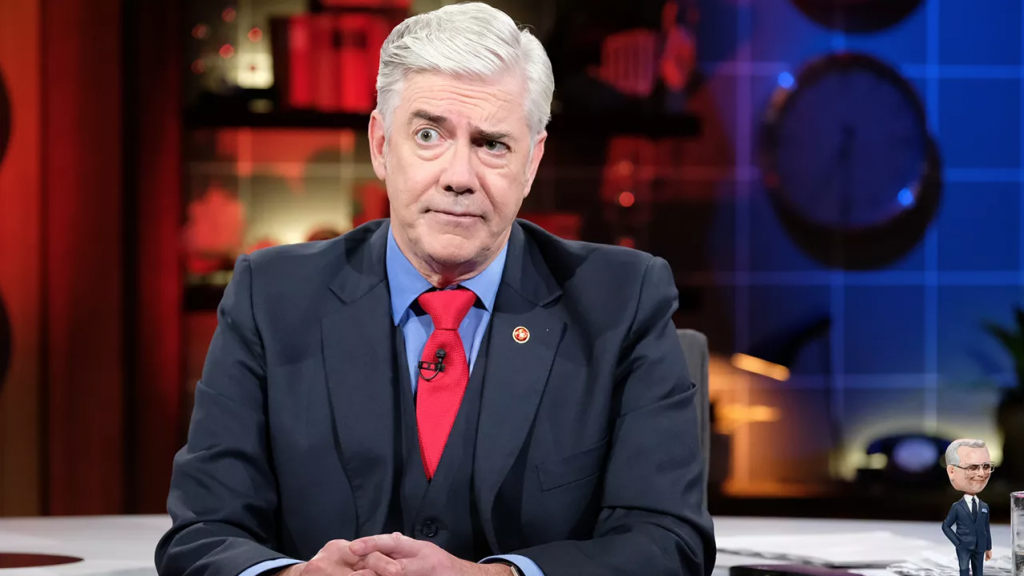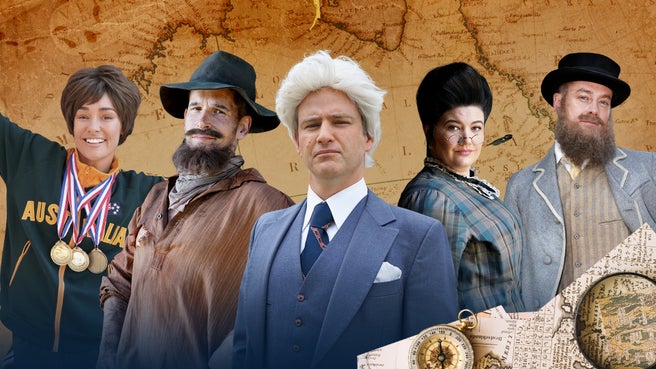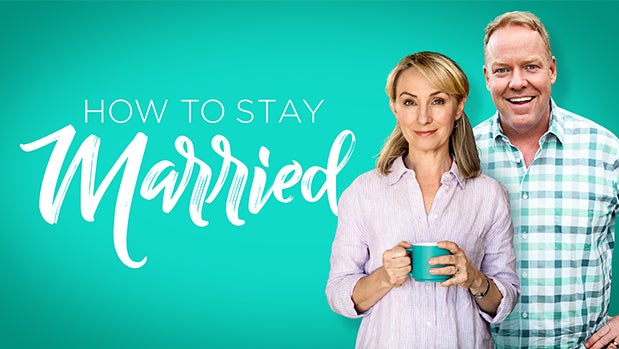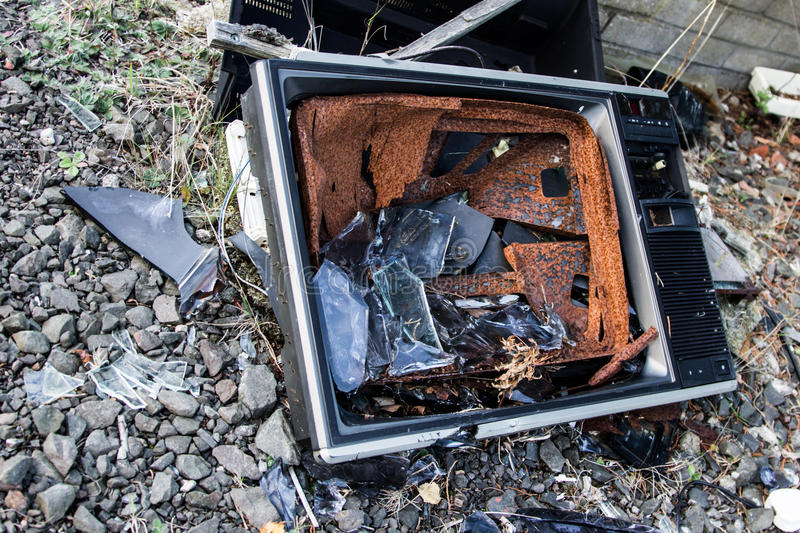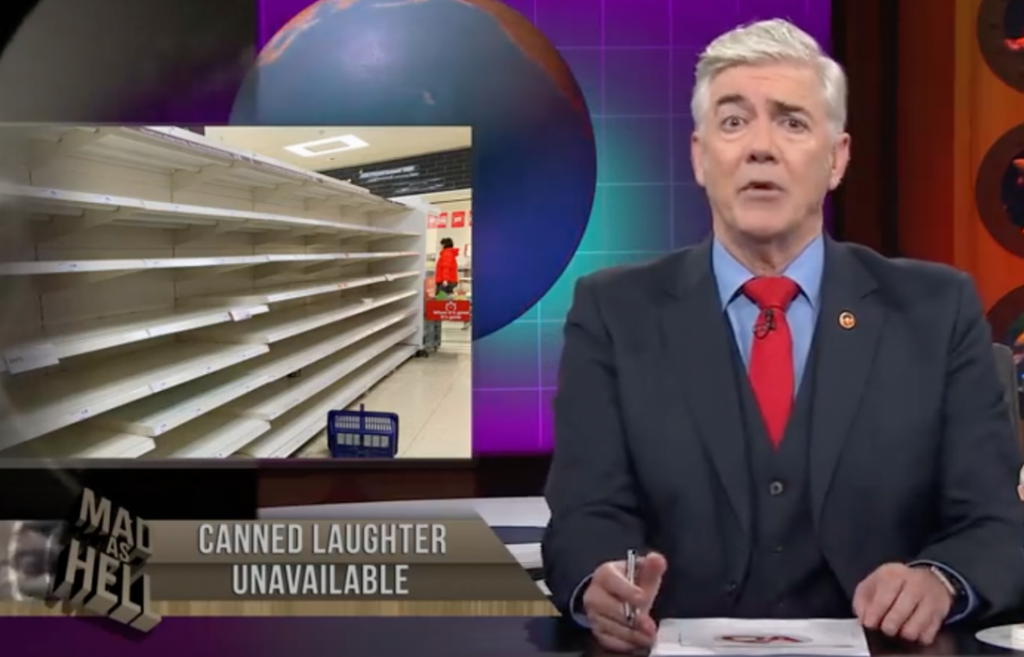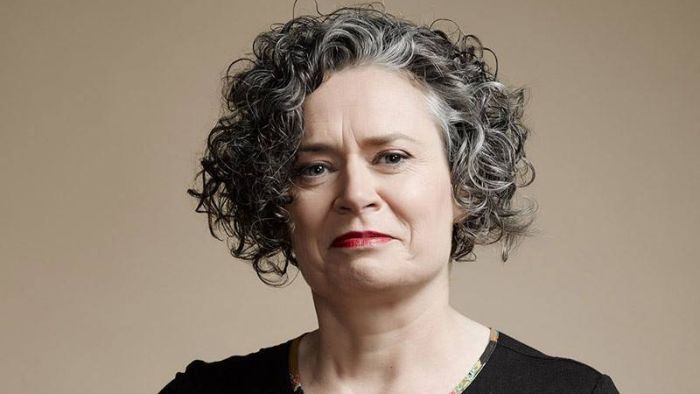Australian Tumbleweeds
Vale Mad as Hell series 11
As seems only fitting in these unsettled times when we’re all scrabbling for the smallest snippet of certianity, Mad as Hell series 11 ended with host Shaun Micallef letting us know that he and the rest of the team would definitely be back later in the year. They also spent much of the episode hammering home the currently largely overlooked fact that our current federal government is packed with liars, shonks, intellectual dim bulbs and marginally competent charlatans. Presumably to balance out The Weekly, who are back next week and must be jumping at the chance to run more jokes about the state of the housing market.
But as we farewell the latest production from Giant Baby – no, not that giant baby
(Peter Dutton’s proxy Brion Pegmatite seen in a rare moment of… pleasure)
It’s time to take a look back at what has to be one of the stranger news satire shows currently being made in the English-speaking world, even if this year the Kraken’s appearances were kept to a minimum. At a time when “news satire” basically just means a smirking scold lecturing the audience on the latest cons and thefts from the various right-wing grifters that have set up shop as Supreme Leader, Mad as Hell… okay, it does its fair share of that.
Refreshingly though (in an Australian context at least), Mad as Hell seems to mean it, often coming across as both authentically angry and generally dismayed at the local council-level cretins found infesting politics at the Federal level. The days of The Chaser’s insipid “hey, they’re all the same really, here’s Julie Bishop in a staring contest, what a good sport right guys?” are over… at least until next week, when we can look forward to the return of whatever blah blah blah.
That’s not to downplay the serious comedy chops on display every episode. There’s no weak link here: the writing is world class, the performances are uniformly excellent, and for a show that must be run on a shoestring all involved consistently make the obviously low budget nature of some of the sketches into a plus.
Reportedly it was once common (before the money completely dried up, that is) for comedy performers to hear that audiences wouldn’t go for rough and ready sketch shows because they’d only watch expensive, polished productions. Mad as Hell repeatedly proves that attitude to be as ill-informed now as it clearly was back when the idea of any network paying for a polished sketch show wasn’t like something out of Narnia.
Let’s not forget – though the fact it’s possible to do so is a salute to the show’s professionalism – that two-thirds of the way through this season the audience suddenly wasn’t there. For Australia’s other “live” comedies this would be a blip at best; both The Weekly and Have You Been Paying Attention?, while happy to surf on the live audiences reactions, aren’t exactly built around responding to the crowd.
Mad as Hell though? Whether it’s Micallef milking laughs with a raised eyebrow, using their response to time a joke, or cutting to plants in the crowd to set up segments, increasingly the audience is an active participant in the goings-on in a way rarely seen in recent studio comedies.
So no audience was a big problem. But after a few minor bumps (and they were really only bumps compared to the show with an audience) and one excellent sketch about adding a laugh track, the show took the impact of coronavirus in its stride. Fingers crossed all of us at home can do the same.
You’re Going Home in the Back of the Divvy Van
Press release time!
Julia Zemiro’s Home Delivery returns to Wednesday nights on ABC
Premieres Wednesday 20 May at 8pm on ABC and iview
The ABC’s beloved series Julia Zemiro’s Home Delivery returns for its eighth season on Wednesday 20 May 8pm on ABC and iview. Julia traverses the country to meet her guests. They come from around Australia and an assortment of professions, all with a passion to effect real change in the world.
“Little did we know when we were filming this 8th series of Home Delivery that the world would soon be in lockdown,” Julia Zemiro says. “Presenting these shows to an audience now feels a bit more special. I’m so thrilled we can share with you eight brilliant people walking us through their past and reflecting on the future… a future they had no idea would include Coronavirus.”
“There’s a bittersweet quality in watching those musings now,” Julia adds. “Personally, I’m moved also by my physical closeness to each guest and how that is no longer possible. Our guests come from Science, IT, Politics and more particularly the Arts, an Industry that has become so vital in keeping our spirits alive in this lockdown period. Enjoy. ”
The new series kicks off with a trip down memory lane with Australia’s favourite boffin, Dr Karl Kruszelnicki, while other guests include, maverick Senator Jacqui Lambie, comedian, social media queen and bushfire heroine Celeste Barber, actor and activist Yael Stone, comedian Craig Reucassel, legendary film director Gillian Armstrong, billionaire software entrepreneur Scott Farquhar and singer-songwriter Casey Donovan.
As Julia’s guests visit significant sites from their formative years, they ponder their lives and the paths they have forged so far, sharing personal stories from their childhoods to the present day, giving the viewer a real insight into their public and private persona.
Remember when this was a show about comedians? Yeah, us neither. Still, it’s back yet again and it’s replacing Hard Quiz in what is presumably still technically a comedy time slot – though really, 8.30pm Wednesdays seems to be the only timeslot the ABC is fully committed to running comedy in… and The Weekly starts there next week.
(also, “bushfire heroine Celeste Barber”? Did she actually go out and fight the fires while we weren’t watching?)
Adding One More to the Lockdown
Press release time!
Luke McGregor joins The Weekly with Charlie Pickering, watching the news so you don’t have to!
ABC is pleased to announce The Weekly with Charlie Pickering is back from April 29, locked down inside the ABC’s sanitised bubble and holding your well-washed and hopefully gloved hand through the next 14 weeks of the End Times.
Joining The Weekly this season is Tasmania’s own Luke McGregor, who has finally found a use for his Economics degree. With the economy falling apart, no one is better placed to guide us through these anxious times than a deeply anxious comedian with an enduring passion for graphs. Prepare to watch an adult man apologise to a virus while willing a curve to flatten.
Luke McGregor said, “I’m really excited to join The Weekly team. One, because I’m a fan of the show; and two, because I’m at home self-isolating with nothing to do and this gives me a reason to shower.”
Charlie Pickering added, “After being bullied for five years by a Logie-winning red-headed comedian with an out of control ego, I’m very happy to be joined by a Logie-winning red-headed comedian with no ego at all. I’m even happier that he’s one of my favourite comedians in the country.”
Luke isn’t the only one keeping Australia laughing in season six of The Weekly. Historic times call for a cast of historic proportions. Joining Charlie will be Judith Lucy, Gold Logie winner Tom Gleeson, Adam Briggs and a phalanx of Australia’s funniest to laugh right up in adversity’s face.
In a world that makes no sense, you might as well turn to the team at The Weekly with Charlie Pickering Wednesday 29 April at 8:30pm on ABC and iview.
As with literally every other piece of casting news at The Weekly, this is good news. It’s a show that could most definitely do with new talent, as shown by the two comedy quotes in this press release: one contains a slightly amusing joke, while the other contains a slightly amusing joke which is then promptly walked back just in case we thought for a single solitary second a blatant insult might have somehow made its way into a press release. Is there a comedian in this country who isn’t one of Charlie Pickering favourites?
The real question here is, will McGregor be a regular like Tom Gleeson is a regular (one to two segments a week every week), like Judith Lucy is a regular (roughly two segments every three weeks) or a regular like Briggs is a regular (Briggs is a regular?). Actually, now that Briggs can’t do his oddly-located interviews with big name politicians or appear in the occasional pre-recorded sketch, maybe they’ll be forced to let him be as funny as he is pretty much everywhere else.
Anyway, it sounds like McGregor is going to have a regular segment on the economy, and while we’re not expecting it to reach the heights of Tosh Greenslade in a Wig and Glasses on Mad as Hell, the idea of getting on board actually funny people for regular segments on topical issues is a good direction for The Weekly to take. Will it last more than a few episodes? We’ll have to watch more than a few episodes to find out!
Go home, Australian history, you’re drunk
Ten took their time to make a full series of Drunk History Australia, one of the better pilots from 2018’s Pilot Week. Has it been worth the wait?
Well, try and stop us laughing at Wayne Hope as cannibal convict Alexander Pearce, as he chomps and slurps his way through some human ribs. But then Hope knows how to nail visual comedy, every succulent, gleeful bite of it.
Em Rusciano is pretty funny too, struggling with a glass coaster that keeps sticking to her cocktail glass, as she tries to drunkenly tell the story of Olympian and flag-pinching ratbag Dawn Fraser. And James Matheson, recounting the tale of the dismissal of Gough Whitlam, brings a lot more to his telling than the average storyteller.
Matheson, like all the best performers on this show, knows how to hit his drunk comedy sweet-spot, where he’s just sober enough to be able to harness his drunkenness for comic effect but not so pissed that he’s ended up all dull and maudlin, and incapable of telling a joke.
Less successful, and very much down the dull and maudlin end of the spectrum is Matt Okine, who tries to get laughs by using the language of rap to explain how Banjo Patterson came to write ‘Waltzing Matilda’. It was a nice try but didn’t quite work. We enjoyed Tex Perkins as Banjo Patterson though.
And, in fact, most of the supporting cast, who have to act out the narrators’ nonsense for us at home, are pretty good. They include some well-known local comedy types, such as Greta-Lee Jackson as Malcolm Fraser, Aaron Chen as an Olympics official, Susie Youssef as Dame Nellie Melba and Stephen Curry as Gough Whitlam. And, in inspired casting, Mark Humphries as idiot Liberal opposition leader Billy Sneddon, complete with a Shadow Cabinet featuring blokes with $50 notes in their jacket pockets instead of pocket squares. Because who doesn’t love background jokes and satire about rich elites?
Drunk History Australia isn’t always hilarious, though, as its charm depends a lot on whether the comedian telling the story is the sort of person you’d like to get pissed with. Something which is especially important if you, the audience, happen to be sober. Because, when everyone’s drunk, everyone’s laughing, but when you’re sober and they’re drunk, it’s generally not so cack-tastic unless the drunk person is someone you like and laugh at when they’re sober.
Marriage is an Invasion of Privacy
Last Thursday Channel 10 looked across this great brown land and decided we all needed some cheering up. So they released the entire second season of Peter Helliar’s How to Stay Married on their streaming service 10Play. That wasn’t the part designed to cheer us up though – it was that they didn’t bother promoting it in any way before releasing it.
Now that we’ve seen a bit of it – and can confirm that it’s pretty much business as usual with the Butler family, which is to say if you’re a fan of bland family sitcoms that feature sassy little kids and bungling parents surely you’ve got plenty to choose from already – it’s tempting to suggest that this is 10’s way of dumping a stinker they have no real interest in clogging up their free-to-air schedules with. So very tempting.
But with our snark hats off (and those things don’t come off easily), it seems more likely that this (limited) online release is more about trying to drum up interest in a show that, to the best of our knowledge, did not set the world on fire with its first season. The free-to-air schedules are going to be messed up for months to come and while this is never going to be prime-time material, it’s still first run content. That’s got to be worth something.
Whether it’s worth your time is another question entirely. Episode one features an almost impressively low-stakes plot – the oldest daughter is having a cool friend over and she doesn’t want her parents embarrassing her, while the B story involves a turtle pissing on people – which is then used to set up a number of low-laugh situations. It’s a show that really relies heavily on the audience finding Peter Helliar charming, especially as for some reason Lisa McCune (who actually is charming) is still playing the unlikable one.
It’s hardly a dead loss, but where a lot of Australian scripted comedy feels like a dashed-off first draft, this feels polished in a way that’s even more dispiriting. It’s not like this show was aiming high and fell short: this is exactly what they were going for – a bland, inoffensive, colourless showcase for Helliar’s non-existent romantic comedy chops.
Just look at the basic comedy set-up: to avoid embarrassing their daughter, Greg (Helliar) is told to stop trying to be friendly, while Em (McCune) is told to stop constantly asking questions. Which trait is likable, and which is painful? It’s no spoiler to reveal that the episode ends up with the parents winning over the kids, but while Greg does so by – you guessed it – being friendly, Em does so by… recounting a teenage lesbian experience?
Shouldn’t the comedy come from the reveal that what the daughter wanted her parents to hide about themselves is actually what her friends find appealing about them? But then that would require Em to also have an embarrassing trait that was also kind of likable, and if both characters are likable then Em is obviously going to seem more likable because she’s played by Lisa McCune and suddenly it’s like “hang on, why isn’t she the star of the show?”
(also, wasn’t this supposed to be a sitcom about Greg struggling to be a stay-at-home dad while Em dealt with returning to the workforce? How does she have time to hang around the house on a weekday after school?)
Obviously that can’t be allowed to happen. Trouble is, while this is Helliar’s show – he created it, he’s the big name comedy star here – the role of a basically realistic daggy dad just doesn’t suit him. It’s a little unsettling that his best work comes in the opening scene where he becomes increasingly angry at his daughter for not coming out of her friends house; where McCune comes across as someone stressed entirely due to circumstance (and poor scripting), Helliar here seems like the kind of overly jolly knockabout bloke you’d always be just a little wary of. Let’s put it this way: the scene where he faux-sinisterly clubs a bag of ice with a cricket bat is probably his funniest moment of the episode.
You can go a long way in Australian comedy if you’re a white guy who keeps on saying you’re just a wacky regular bloke. It doesn’t matter if it’s clearly not true – wacky regular blokes don’t get their own sitcoms. But without that essential charisma, eventually the fun guy mask starts to slip: this is one relationship where the thrill has most definitely gone.
Can Australian comedy survive the coronavirus?
Humanity has always needed a laugh. Even our monkey ancestors probably had one or two amongst them who would stand-up, while everyone else was sat around the fire of an evening, and bust out a tight 10 about how there’s always someone in every camp who can never be relied on to light a fire properly. You know what I’m talking about, right? Seriously, what is the deal with those guys?
And so, in these times, which people are so fond of reminding us are “extraordinary”, comedy carries on, via Skype, Zoom, WhatsApp or just the good old-fashioned telephone. And TV and radio programs, podcasts and YouTube videos continue to be made even as much of the world’s population is social distancing.
At first, it was just a few older celebrities going a bit nuts in their homes:
View this post on Instagram
Now, proper radio and TV shows are coming to you live from the hosts’ living rooms.
The team behind Triple M’s Kennedy Molloy have been broadcasting from separate places for at least a week now, desperately trying to put out a good show even as Triple M’s parent company faces problems as a result of the drop in advertising dollars. In Friday’s episode, Molloy and Kennedy seemed almost in tears during the end-of-show live read, almost begging new sponsors to come on board and keep them on air.
[SIDEBAR: As much as it’s difficult to feel sympathy for commercial radio after all these decades of crap music and even crapper content, the people who work at organisations like Southern Cross Austereo are real people with families and mortgages, so we wish them well.]
What has been interesting about this crisis, though, is how good a show can be even with everyone working in separate places and sounding a bit weird. Good comedy comes from good ideas and good chemistry, and the idea of Molloy and Kennedy ringing up some of Australia’s older comedians – Glenn Robbins, Denise Scott and Tom Gleisner – and seeing if they’re okay was a great one.
There’s also plenty of other interesting Australian comedy stuff happening all over the place as a result of the shutdown, which we’ll write about over the coming weeks. But, for now, here’s a quick shoutout to the podcast A Rational Fear, which had the very good idea of inviting comedians who’d had their Melbourne International Comedy Festival shows cancelled to come on and perform five minutes.
And who knows, maybe this time of crisis will force other innovations and format changes that will improve comedy in the future. Plenty of other organisations are changing rapidly, such as schools and universities, who after several decades of pissing about not delivering online learning, have finally been forced into making lectures and classes available on the internet.
So, how will comedy change? Here are a few predictions:
- Some organisations, including some well-known ones, will not weather this storm financially and will have to close. Organisations who were already in trouble or which ran on very tight margins will be most affected.
- Other organisations, who haven’t been doing so well in recent years, will regain their pre-internet status. The ABC is just one of many traditional, state broadcasters around the world who have suddenly seen their ratings soar as people clamour for accurate and trustworthy news. And perhaps some of their new viewers will stick around for the ABC’s locally made drama and comedy too?
- More and more people will shift to online, particularly older generations, who will be forced to learn how to use apps and streaming services to keep connected to family and friends and to stay entertained and informed.
- Broadcasters who’ve previously taken conservative decisions when it comes to commissioning new shows will be forced to be braver. Decisions will be made on what can be produced under the conditions of social isolation rather than what looks good or is fashionable. This will mean no more sitcoms, dramedies and panel shows for the foreseeable future, but may result in some interesting attempts at chat shows, stand-up and improvised comedy, shot in people’s homes. We may also see broadcasters dust off shows they’d made but shelved, or re-play some interesting archive material – or even pilots – in an attempt to fill up schedules and keep people entertained.
- The public will want belly laughs as this crisis deepens, not depressing, tedious dramedies about people of privilege experiencing mild peril (Everything’s Gonna Be Okay, The Other Guy). Good writing and strong comic ideas will be more important than ever, as poor writing can no longer hide behind high production values and large marketing budgets. Viewers will be looking for pure, funny, resonant material – and anyone who can work out how to provide that in the current climate will do well out of this.
In short, a new comedy golden age, springing up in the toughest of circumstances, could be with us soon. To survive the coronavirus, comedians and content providers will have to be innovative, brave and funny. And for those who can’t? Well, there’s only one thing they can do: get a job in a supermarket or down the local toilet paper factory. They’re doing pretty well right now.
So We’re Just a Mad as Hell Fanblog Now, Huh
The good news is, Australian television comedy continues today exactly as it would have if a lethal pandemic wasn’t killing thousands across the globe. The bad news is, Australian television comedy continues today exactly as it would have if a… you get where we’re going. Unlike live comedy, there’s been no wave of cancellations across the comedy TV schedules: this grim wasteland was always in our future.
Of course, some shows deal with it better than others. If you thought Hughsey We Have a Problem couldn’t seem more irrelevant you haven’t been watching the news of late: everyone now has a really big problem and if Hughsey has the solution he’s keeping it to himself. Still, it could be worse: it’s a great show when the news is bubbly and light, but is anyone really looking forward to twenty-something weeks of all death-toll news coverage on Have You Been Paying Attention?
The upside is, of course, Mad as Hell, which turned up for its second week of no studio audience ready to rock. More pre-recorded sketches unrelated to the current news seemed to be the main answer to “how will they cope?” (though the final sketch about Simpson’s donkey was at least slightly related to the news of Australian troops in Afghanistan committing war crimes), though interestingly there seemed to be slightly less of the dead air after Micallef’s desk jokes this week.
Are we just getting used to it? Or is Micallef using tiny bits of non-essential business – small movements, a brief linking phrase, etc – to do the same job of giving people room to laugh but without leaving a gap of dead air for the viewers at home? This is the kind of thing you fixate on when the only other option is to re-read the TV guides half-hoping that Ten has bunged on repeats of How To Stay Married.
Fortunately for both us and Mad as Hell, the show’s news format is elastic enough to cope with an extended period where the news is a): basically the same week after week and b): not really that funny. No doubt the current crisis is making everyone’s job a lot harder, but the show itself can pivot fairly smoothly away from direct news coverage to looking at a wider range of topics without turning into something else entirely. Which we’re assuming The Weekly is going to have to do – after all, how are they going to keep on dragging around the corpse of Hard Chat if Gleeson has to stay two meters away from his guests?
(oh yeah, Skype. Fuck.)
But that’s just another part of the grim future that lies in store for us all. For now, real questions remain. Like does anyone else think the PM decided to hold his big “here’s how it’s going to work” press conference at 9.30 on a Tuesday night specifically so it’d be too late for Mad as Hell (which is recorded Tuesday evening) to make fun of him?
The Sounds of Silence
Mad as Hell without an audience? How’s that going to work?
As it turned out, pretty well. Which should have come as no real surprise considering Shaun Micallef did roughly the same show without an audience for years (that’d be Newstopia, by the way). Obviously the situation wasn’t ideal, but these days what is?
(also, why isn’t Newstopia available anywhere? There’s more than enough gold there for a brilliant best-of collection. Does no-one remember Inspektor Herring?)
One of the big problems with Micallef’s best, yet sadly dismissed by many (including the man himself) sitcom Welcher & Welcher is that it really needed – but did not have – a studio audience. The show’s one major flaw was that its joke-heavy structure required Micallef and the cast to pause slightly after a laugh line (so the viewers at home were able to chortle), which sapped the show’s energy.
Likewise with Newstopia, which was packed with quality sketches and pre-recorded bits, but often felt slightly stilted when it came to the show’s meat & potatoes: news gags delivered by Micallef from behind a desk. Again, the problem was the death pause after a joke. Micallef’s style of performance really does require that kind of “huh, geddit?” moment after he delivers a zinger, but without an audience actually laughing the silence tends to – again – sap the show’s energy a little.
So how did Mad as Hell get around that? To be fair, it didn’t always: some of the early to-camera bits felt a little bit rough. Partly that’s a result of MaH‘s busy format: it could be argued that Newstopia did better with the to-camera stuff because there Micallef just delivered it straight, while with Mad as Hell there’s usually jokes working on a number of levels (the joke photos & captions, Micallef’s performance, the script itself), and it’s the audience’s laughter that ties it all together.
But that’s a minor quibble when a show has material this strong. Micallef often does his best work when he has someone to play off, and much of MaH is structured to give him exactly that, whether it be interviews, “audience” questions, or his own befuddlement. Yes, the actual audience has that role too, but he did an admirable job without them.
And seriously, who’s watching Mad as Hell for the audience anyway? Whether it was the bulky laugh machine, the return of Curiosity Cul-de-Sac (updated for the Stateless generation), everyone playing up to possible home viewer Tom Hanks or just Micallef washing his hands, it remains prime hilarity even after eight years, eleven seasons and a viral plague sweeping the globe.
That said, fingers crossed this whole coronavirus thing is somehow magically over and done with in the next month. We’re not that fussed about not leaving the house or society collapsing or dying or anything – we just don’t want to see hot virus takes served up by The Weekly.

